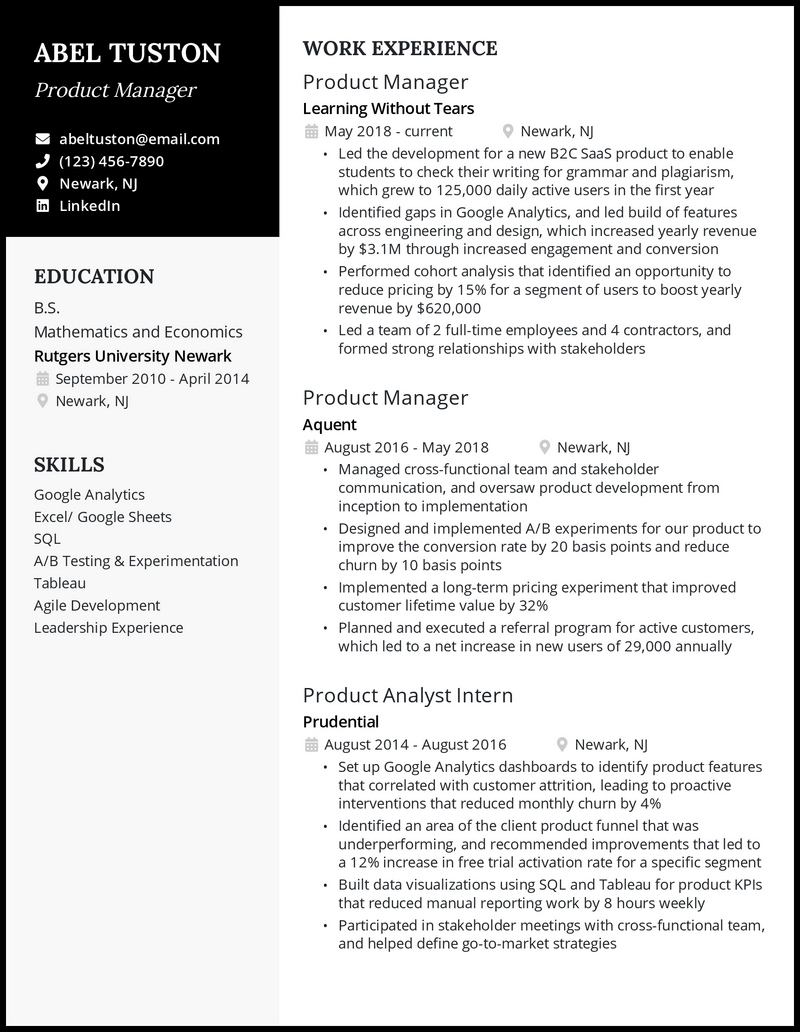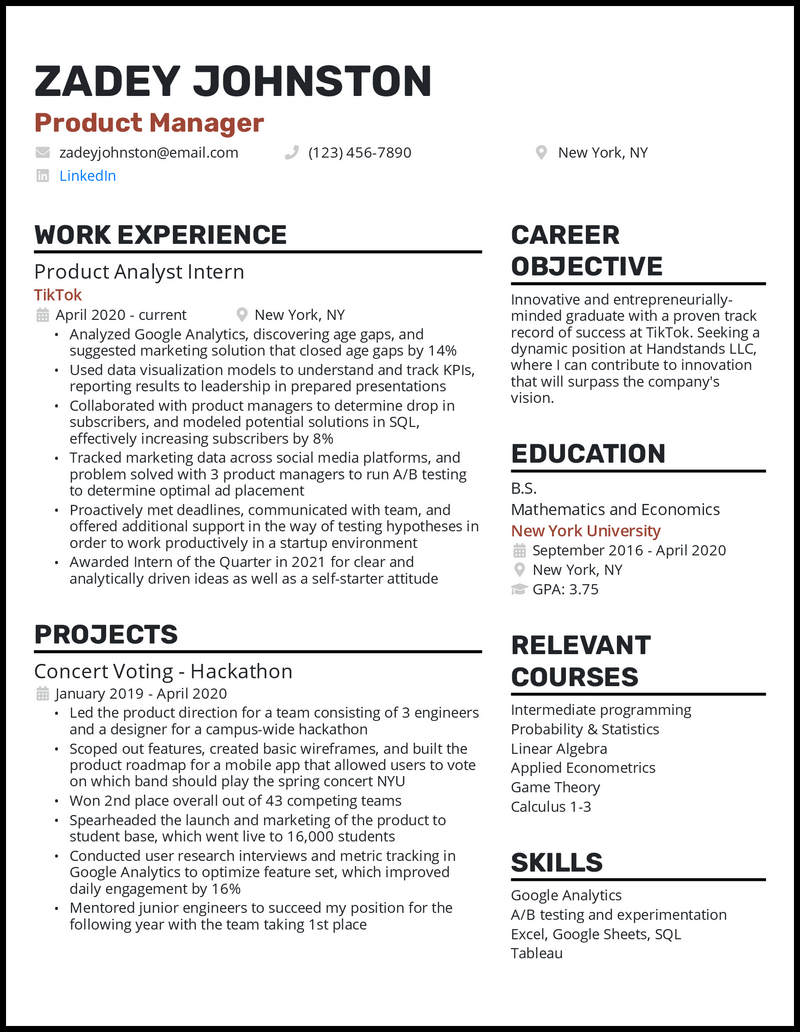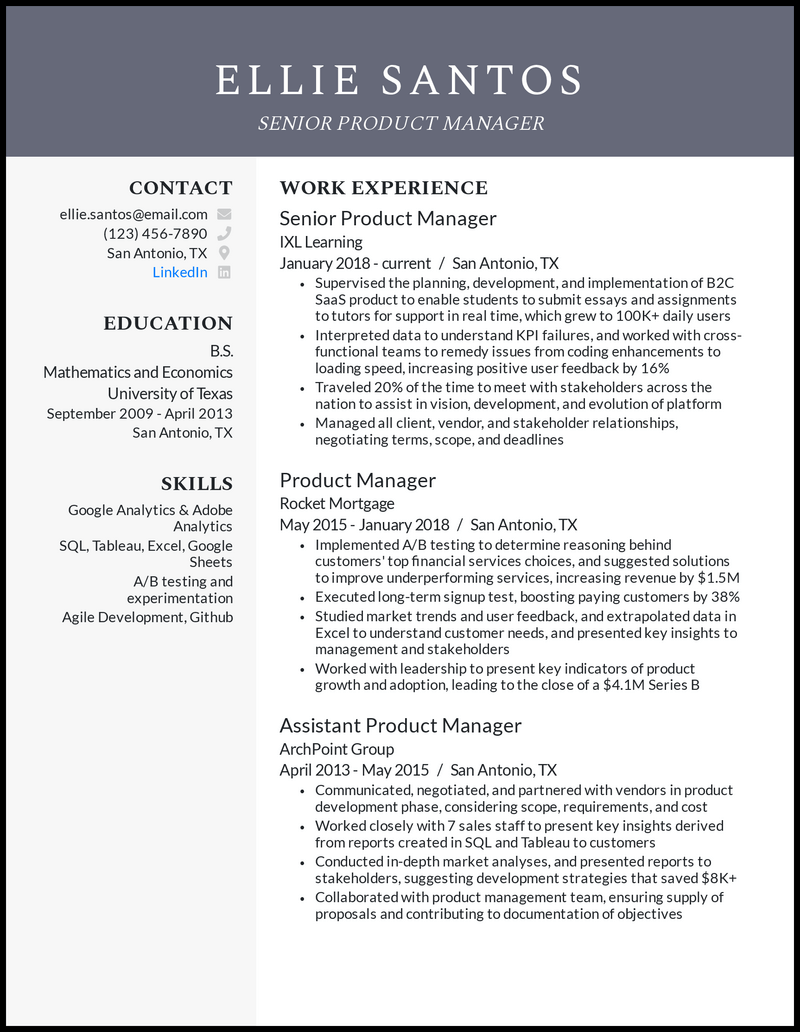

There’s plenty of room in our elegant resume template to add your professional experience while impressing recruiters with a sleek design.
Like this template? Customize this resume and make it your own with the help of our Al-powered suggestions, accent colors, and modern fonts.
You’re a great product manager. You can easily balance feature requests, talk to customers, and jump between conversations with marketing and engineering folks like it’s no big deal.
You shouldn’t have to be an expert in resume writing, too. However, resumes are essential to getting a product manager job, so even though it’s tedious, you have to learn to do it right.
Luckily, that’s our specialty! We’ve helped hundreds of applicants perfect their resumes and product manager cover letters to land jobs at great companies like Slack and Google.
Our product manager resume samples, tips, and free resume templates are proven to help you craft a resume that attracts hiring managers and gets you one step closer to your dream job in 2024.






 9 years of experience" width="800" height="1032" />
9 years of experience" width="800" height="1032" />















 9 years of experience" width="800" height="1032" />
9 years of experience" width="800" height="1032" />

 9 years of experience" width="800" height="1032" />
9 years of experience" width="800" height="1032" />
















The Bureau of Labor Statistics (BLS) shows that the median salary for a product manager is $147,000, and the demand for these roles is expected to grow faster than in other positions. More than the salary and growth potential, though, product managers get to work on exciting and challenging projects.
They’re the shepherds of new products at a company, and they ideate new concepts by talking to customers and analyzing data. PMs are also responsible for working across teams, from engineering to design to marketing, to turn these product ideas into reality.
A great product manager requires creativity, an analytical mindset, and superb people skills. So how can you successfully demonstrate these abilities with a one-page resume?
In short, here are the four things you need to do to create a successful product manager resume:
![]()
Getting your skills right on your resume is a catch-22. Why? Because there are three review phases for a typical company:
With all these steps, how can you be sure you’re maximizing your chances of acing your first interview?
We’ll start with the first step: to get past the ATS filters, you must include the right role-related keywords on your resume.
For example, suppose the product manager job description clarifies that they require candidates to have experience with Agile development. In that case, you can be sure the ATS will filter for that keyword. Here are some more product manager skill keywords to include (if they match your experience):
When you’re past the first stage of the resume review, you need to make your resume appealing to humans. This means avoiding a lengthy list of resume skills.
It’s a huge red flag for hiring managers if they see a candidate with a paragraph of their skills. Why? Because it signals one of two things:
It’s better to demonstrate expertise in a few skills than a passing understanding of many tools or methodologies.
The rule of thumb is only to include skills for which you’d be comfortable being interviewed. Lying on your resume is a surefire way to the company’s blacklist for potential employment.
You’ll notice that the list of keywords above only includes hard skills. ATS filters are almost exclusively used to filter for hard skills. For this reason, don’t include soft skills in the skills section of your resume.
Put yourself in the shoes of a hiring manager: you’re looking at a resume where a product manager included “communication” as a skill they possess. It’s much better to demonstrate your communication skills in the context of your work experience than as an isolated keyword.
![]()
Formatting your resume is relatively straightforward. Here are the major things you need to know:
No matter where a person looks on your resume, they should be able to quickly conclude that you’re a great fit for the product manager role to which you’re applying. This means your formatting needs to be easy to read at a glance.
Make the job of the person reviewing your resume as easy as possible.
Ed-tech company
May 2018 – Present, New York, NY
Product Manager
Ed-tech company
May 2018 – Present, New York, NY
Product Manager
![]()
A resume objective helps you demonstrate a few of your skills and why you’re passionate about a particular role. The only times you should include a resume objective is if you’re either
A resume summary is a quick overview of a manager’s experience or qualifications for a given role. You should not include a resume summary unless you have 10+ years of experience.
Most of the time, you don’t need a summary or an objective since they rarely demonstrate anything that can’t be learned from reading the resume.
Experienced product manager seeking to leverage my analytical and creative skill sets to create products that have a meaningful impact on users.
Product manager seeking to leverage my experience in fintech to contribute to the Stripe mission of making payments easy and accessible for small businesses across the world.
Product manager transitioning from a career in engineering looking to leverage my technical background in an environment like Google to create products that make it easier for non-coders to build businesses.
Can you see the difference between these examples? The first is overly generic and provides no insight into the candidate’s qualifications. It’s just keyword-loaded filler.
The latter two examples demonstrate why the product manager applying for the role is a good fit.
![]()
Always include the school you attended and the degree you earned in the education section of your resume. If you had a minor, include it here.
If you’re applying for an entry-level role, your education section will look a bit different from a senior product manager. Here’s some advice for education content based on your seniority level:
![]()
As a product manager, you can leverage data and user insights to develop new products and product features. You’re also used to setting goals for each project and defining metrics for each of those goals.
These abilities are vital to your product manager resume since your resume needs metrics to really stand out. Metrics revenue, customer adoption, growth, and customer satisfaction are ideal for product manager resumes.
Measuring impact is vital for any successful product manager, and hiring managers want to see that you have this ability. More than that, quantifying the impact of your work is much more convincing than general statements.
For example, saying, “Developed a new product that grew substantially in 2019” is not nearly as convincing as saying, “Developed a new product that grew from 0 to 37,000 daily active users in 2019.”
![]()
You likely don’t have work experience if you’re an entry-level product manager, but companies want to hire people who can prove their interest in product management. To do so, you should talk about projects you’ve worked on.
Did you do your research for a potential app idea you have? Did you create wireframes for a website you wanted to build? You should aim to quantify the impact or scope of these projects.
If you don’t have any projects worked on, now is a great time to make it happen. Reach out to local small businesses you can help, do market research for a potential product and put together a PowerPoint with competitive analysis for an existing product you like. Demonstrating an initiative like this can do wonders to get your foot in the door!
If you’re stuck on what to write in your entry-level bullet points, here are samples for inspiration. This job candidate chose to share about project experience for a campus-wide hackathon.
![]()
The job responsibilities of a product manager vary drastically from company to company and even from department to department.
As such, you want to tell a cohesive story about why you’re the best fit for the company. One major variable about your product management story is the stage at which you worked to develop products.
Yes, this means customizing your resume for each job to which you apply. The best way to do this is to create a few versions of your resume. For product managers, it’s recommended you have the following types of resumes:
It’s more work, but it yields significantly better results. Our data shows that customizing your resume for each job application results in 36 percent more interviews. It’s worth the effort.
You should try to relate your past work to the given environment. Look at the job description for the role you’re seeking to determine which of your resume versions addresses what they want for the position.
Next, if you have industry-specific experience, you should customize your resume to talk about that experience as much as possible.
![]()
You’re well on your way to creating an incredible product manager resume and landing your dream job. To save time and increase your chances of an interview, follow our tried and true resume-writing tips:
With a great resume comes great responsibility. So go forth and apply wisely. We’re cheering you on. Before you know it, you’ll have interviews lined up for your next product manager role!
Gut the guesswork in your job hunt. Upload your existing resume to check your score and make improvements. Build a resume with one of our eye-catching, recruiter-friendly templates.
• Work in real-time with immediate feedback and tips from our AI-powered experience.
• Leverage thousands of pre-written, job-specific bullet points.
• Edit your resume in-line like a Google Doc or let us walk you through each section at a time.
• Enjoy peace of mind with our money-back guarantee and 5-star customer support.